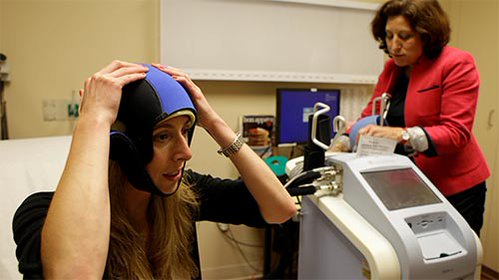FDA approves cap that can reduce chemotherapy-induced hair loss


A free daily email with the biggest news stories of the day – and the best features from TheWeek.com
You are now subscribed
Your newsletter sign-up was successful
For some people, the thought of losing their hair is enough to keep them from starting chemotherapy, but a new treatment approved by the FDA has been shown to reduce the side effect.
The Dignitana DigniCap Cooling System works like this: A patient puts on a cap, which is connected to a cooling machine. The cap chills the scalp, in turn constricting blood vessels so the chemotherapy cannot penetrate hair follicles. "Hair loss is probably the most dreaded of all the side effects of chemotherapy," Dr. Tessa Cigler, a medical oncologist at the Weill Cornell Breast Center, told ABC News. "There's women who refuse treatment because of hair loss. Being able to preserve one's hair during chemotherapy is very empowering."
The treatment originated in Sweden and is available in several European countries. During a clinical trial in the U.S., 7 out of 10 patients with early stage breast cancer receiving the treatment kept at least 50 percent of their hair, and no adverse side effects were reported. The DigniCap has only been cleared for use in women with breast cancer, as they were the participants in the clinical trial, and women with solid tumor cancers. After being diagnosed with breast cancer in January 2014, trial participant Donna Tookes had a mastectomy, and then started chemo. She went through 12 treatments wearing the DigniCap, and didn't lose any hair; she's now in remission. "At first it's like a brain freeze," she told ABC News, "but then after you get used to it really fast."
The Week
Escape your echo chamber. Get the facts behind the news, plus analysis from multiple perspectives.

Sign up for The Week's Free Newsletters
From our morning news briefing to a weekly Good News Newsletter, get the best of The Week delivered directly to your inbox.
From our morning news briefing to a weekly Good News Newsletter, get the best of The Week delivered directly to your inbox.
A free daily email with the biggest news stories of the day – and the best features from TheWeek.com
Catherine Garcia has worked as a senior writer at The Week since 2014. Her writing and reporting have appeared in Entertainment Weekly, The New York Times, Wirecutter, NBC News and "The Book of Jezebel," among others. She's a graduate of the University of Redlands and the Columbia University Graduate School of Journalism.
-
 Film reviews: ‘Send Help’ and ‘Private Life’
Film reviews: ‘Send Help’ and ‘Private Life’Feature An office doormat is stranded alone with her awful boss and a frazzled therapist turns amateur murder investigator
-
 Movies to watch in February
Movies to watch in Februarythe week recommends Time travelers, multiverse hoppers and an Iraqi parable highlight this month’s offerings during the depths of winter
-
 ICE’s facial scanning is the tip of the surveillance iceberg
ICE’s facial scanning is the tip of the surveillance icebergIN THE SPOTLIGHT Federal troops are increasingly turning to high-tech tracking tools that push the boundaries of personal privacy
-
 Trump HHS slashes advised child vaccinations
Trump HHS slashes advised child vaccinationsSpeed Read In a widely condemned move, the CDC will now recommend that children get vaccinated against 11 communicable diseases, not 17
-
 Stopping GLP-1s raises complicated questions for pregnancy
Stopping GLP-1s raises complicated questions for pregnancyThe Explainer Stopping the medication could be risky during pregnancy, but there is more to the story to be uncovered
-
 Tips for surviving loneliness during the holiday season — with or without people
Tips for surviving loneliness during the holiday season — with or without peoplethe week recommends Solitude is different from loneliness
-
 More women are using more testosterone despite limited research
More women are using more testosterone despite limited researchThe explainer There is no FDA-approved testosterone product for women
-
 Climate change is getting under our skin
Climate change is getting under our skinUnder the radar Skin conditions are worsening because of warming temperatures
-
 FDA OKs generic abortion pill, riling the right
FDA OKs generic abortion pill, riling the rightSpeed Read The drug in question is a generic version of mifepristone, used to carry out two-thirds of US abortions
-
 RFK Jr. vaccine panel advises restricting MMRV shot
RFK Jr. vaccine panel advises restricting MMRV shotSpeed Read The committee voted to restrict access to a childhood vaccine against chickenpox
-
 Texas declares end to measles outbreak
Texas declares end to measles outbreakSpeed Read The vaccine-preventable disease is still spreading in neighboring states, Mexico and Canada
